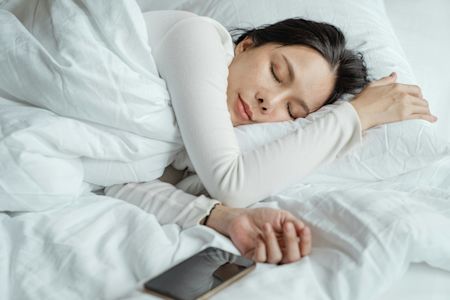Introducing Activate, my brand-new animation for kids
Starring me and my brilliant Activators, it's designed to get kids moving and having fun.
Save £80 and feel fitter, healthier and happier – together.

The moment we crawl into bed after a busy day, lay our head on the pillow, and pull the duvet over ourselves is pure bliss, isn’t it?
It’s no secret that sleep is good for us – but the problem is, we're a nation of pretty poor sleepers. We struggle to go to bed early, and when we are in bed, we can keep ourselves awake for hours, ruminating over the events of our day. And maybe it’s because of this that Brits only get, on average, 5 hours and 54 minutes of sleep a night, according to a 2023 Health Survey Report.
Now, we’ve all heard exercise can help us sleep better – but can sleep help us exercise better?
Moving our bodies is good for us, we know that, but what we do when we’re not exercising – when we’re eating, drinking and sleeping – is all part of the package, too. So to reap the benefits exercise brings, you need sleep.
“So much goodness happens in our bodies when we sleep!” says senior accredited BACP therapist Eve Menezes Cunningham, who specialises in sleep. “Mentally, we process the day and lay down memories. Physically, we recharge, heal, and grow – well, up to a certain age. And emotionally, we get that much needed reset.”
So, how does good sleep boost our workouts?
One of sleep’s main functions is to restore your brain, explains Rudi Coetzer, Clinical Director at Brainkind. During the day, we use our brains excessively: every time you see and process something, it fires a chemical that stimulates a response. Our brain needs to recover. “If you sleep well, you’ll benefit in areas of cognition, concentration, and short term memory – no bad thing for exercise,” he says.
This brain boost we get from sleep is so important for our workouts. By restoring our cognitive function, we can concentrate better. In fact, studies have shown that getting enough sleep motivates people to stick to their workout regime the next day. The more sleep you get, the more likely you’re going to exercise as planned.
And it makes sense, doesn’t it? We’re less stressed when we’re well rested. We’re “replenished, revitalised, renewed” after a good sleep, as Eve says. Because of that, our brains are better able to entertain the idea of taking on a new challenge.
“Even if we somehow are highly motivated to exercise when we've not had enough sleep and rest, we're running on empty,” she adds, “so it'd be like trying to drive a car without fuel. Not only will it not get very far, but damage – whether injury from over exertion or accidents from the cognitive impact of a lack of sleep – is more likely.”
Plus, if you want to reap all the mental benefits exercise brings, you’ll more likely do that with better sleep. A 2023 study by UCL researchers found getting enough sleep is needed for us to get the full cognitive benefits of physical activity. Overall, sleeping between six and eight hours per night and higher levels of physical activity was linked to better cognitive function.
From a muscle point of view, exercise induces fatigue and micro-bleeds in your muscles that need to recover, says Rudi. “To become stronger and fitter, you need to rest,” he says. “People make the mistake of not resting.”
Interestingly, when we sleep, our body produces a growth hormone. This helps our bodies build muscle but also repair what we’ve done to our muscles during a hard workout or a run, for example. This refresh and repair cycle is what helps us get back up and go again.
Because of course, it’s not easy to exercise if our muscles are sore and tired. And if you do plough on and try to workout anyway, exercise can become like a “punishment” because you haven’t slept enough – and it means you’re less likely to continue. Research backs this up, too. Not getting enough sleep makes exercise feel much harder, studies show.
So while the energy that comes from a good sleep is great for your mental energy and motivation to move – the physical reset benefits are just as important. And while it’s no secret that one of the biggest struggles people have is trying to improve their sleep, Eve recommends remembering: “you deserve good sleep”.
“Even if sleep feels impossible, give yourself that time to rest,” says Eve. “Do the things that support you in getting good rest and sleep – and if you don't yet know what works for you with sleep, prioritise getting curious and finding out. You've likely developed the less healthy sleep habits over decades so go easy on yourself as you start to improve them and keep on keeping on. Your body, mind, heart, and soul will thank you for it.”
Need a little help with improving your sleep? Try these tips from sleep expert, Dr Matthew Walker.
This article was written by The Body Coach content team.